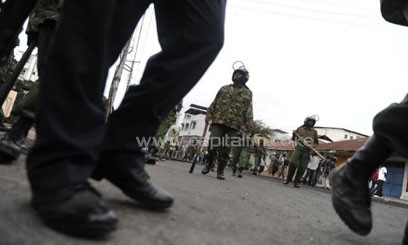
Policemen patrol streets in Kenya during past unrest/FILE
Set up in 2008 after the contested polls, Kenya’s National Cohesion and Integration Commission tries to identify those guilty of hate speech in the run up to the next elections on March 4.
“If you are guilty of hate speech, we will get you,” Milly Lwanga, who heads a team monitoring hate speech at the commission, told AFP.
At the commission’s ultra-modern premises in Nairobi, a group of five men are monitoring social media sites, searching for words or statements that might constitute hate speech.
“The majority of cases we investigate are hate speech charges against big men…politicians, aspiring politicians…people who would do anything to get to power,” said Peter, asking that his full name not to be printed as he feared the consequences.
Internet sites such as Twitter and Facebook have seen a rapid rise in popularity since the last elections, with now over a quarter of Kenyans online.
In 2007-8, it was radio stations that encouraged rival supporters to go out and attack other groups, broadcasting the location of where groups were, while mobile phone text messages were also used to whip up emotions.
One former radio presenter, Joshua Sang, faces trial in April for crimes against humanity charges in the International Criminal Court, charges he denies.
“We have almost 100 employees – some located here, others in the field,” said Kyalo Mwengi, a legal officer at the commission.
Field officers primarily attend political gatherings to monitor what is said there, and include police officers, journalists, students and community leaders.
“They blend in and send us everything in raw format,” Mwengi said, adding that the Nairobi-based team then trawl the audio or video recordings.
“If there are elements of hate speech, we summon the person in question … and warn them. Most of those warned cease immediately,” said Lwanga.
Violence following the last elections shattered Kenya’s image as a beacon of stability in east Africa, with what began as political riots quickly turning into ethnic killing.
The violence was the worst in Kenya since independence in 1963, and Lwanga is under no illusion as to the magnitude of the work before her.
“This cannot be done by us alone,” she says. “It is something all Kenyans should take up.”








































